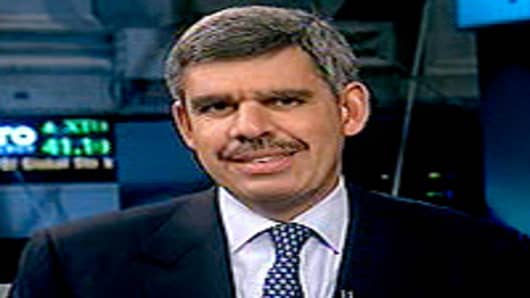Volatile markets that have soared off the financial crisis lows are now adjusting to a world of slower growth and multiple obstacles ahead, Pimco's Mohamed El-Erian told CNBC.
El-Erian, co-CEO of the world's largest bond fund, said markets have shown four distinct characteristics lately: Volatility, interconnectedness, political sensitivity, and improbable movements.
That behavior is a reaction to tenuous European economiesand the realization that policy makers have few stimulative tools left should conditions worsen. As such, households have cut back on spending and decreased their debt even as governments have dramatically increased their own leverage.
"We can dismiss this as noise or we can take them as signs of a paradigm change, of a regime change that is going on slowly but surely. What the markets have been doing over the last few weeks...they're starting to price that in," El-Erian said.
"We're starting to get people to realize that we're not in a 'V' anymore, (it's) more like a square root," he continued. "We're going to come back off (the bottom) and then we're going to level off at about 2 percent growth."
The dynamics fit into Pimco's forecast for a "new normal" of slow economic growth, a pattern the firm expects to last three to five years.
The global economy is in a "structural change" being pushed by changes in balance sheets—the reduction of private and corporate debt and the increase in public debt, El-Erian added
Investors, then, are encouraged to watch the health of balance sheets and certain key economic indicators, which he identified as employment, retail sales and the flow of funds. The latter indicator is released quarterly by the Federal Reserve and details the financial health of the public and private sectors.
The most recent report, from June 10, showed that domestic nonfinancial debt increased 3.5 percent in the past quarter and household net worth grew to $54.6 trillion, a gain of $1.1 trillion so far in 2010.
"Put it all together and it's an image of the private sector delevering and the government relevering," El-Erian said. "That is not an ingredient for sustainable growth. That is the ingredient for a multi-year adjustment."



